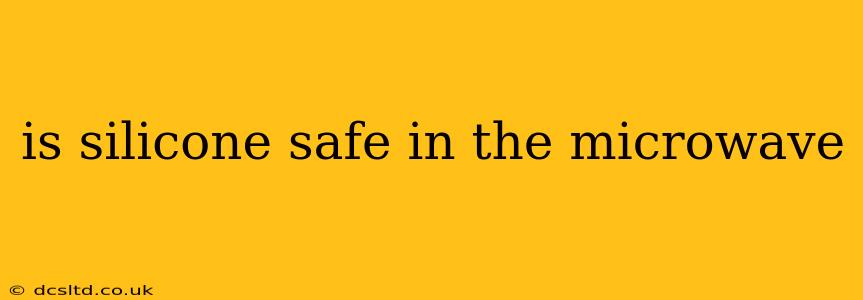Silicone has become a kitchen staple, prized for its flexibility, heat resistance, and non-stick properties. But the question remains: is silicone safe in the microwave? The short answer is generally yes, but with important caveats. This comprehensive guide will delve into the specifics, addressing common concerns and ensuring you can use your silicone cookware safely and effectively.
What is Silicone?
Before we tackle microwave safety, let's understand what silicone is. Silicone is a synthetic polymer, meaning it's a man-made material made up of repeating chemical units. Its structure gives it unique properties: it's heat-resistant, flexible, non-reactive, and non-stick. These qualities make it ideal for various kitchen applications, from baking molds to oven mitts.
Is All Silicone Microwave Safe?
This is crucial: not all silicone is created equal. While many silicone products are microwave-safe, some are not. The key is to look for microwave-safe labeling on the product itself. If it doesn't explicitly state it's microwave-safe, it's best to err on the side of caution and avoid using it in the microwave.
What to Look For When Buying Microwave-Safe Silicone
When purchasing silicone products for microwave use, look for these key indicators:
- Clear Microwave-Safe Labeling: This is the most important factor. The label should explicitly state that the product is safe for microwave use.
- Food-Grade Silicone: Ensure the silicone is explicitly labeled as food-grade. This indicates it meets safety standards for food contact.
- Reputable Brands: Stick with well-known and reputable brands that prioritize quality and safety.
What Happens if You Use Non-Microwave Safe Silicone in the Microwave?
Using non-microwave-safe silicone in the microwave can lead to several problems:
- Melting or Deforming: The silicone may melt or deform, potentially ruining the product and creating a mess.
- Leaking Harmful Chemicals: In rare cases, non-food-grade silicone may release harmful chemicals when heated in the microwave. This is less likely with reputable brands but still a risk with unlabeled products.
- Damage to the Microwave: Melting silicone can damage your microwave's interior, requiring expensive repairs.
How to Safely Use Silicone in the Microwave
Even with microwave-safe silicone, follow these best practices:
- Avoid Overheating: Don't overheat the food or the silicone. Follow recommended cooking times and temperatures.
- Proper Ventilation: Ensure adequate ventilation in your microwave to prevent excessive steam buildup.
- Inspect Before and After Use: Always inspect the silicone before and after microwave use for any signs of damage or melting.
What About Silicone Baking Dishes and Molds?
Many silicone baking dishes and molds are microwave-safe, but again, always check the label. These are often designed to withstand higher temperatures than some other silicone products.
Can I Put Silicone Utensils in the Microwave?
Generally, silicone utensils are safe for brief exposure to microwave heat, but it's best to avoid leaving them in the microwave for extended periods or at high temperatures. Always check the manufacturer's instructions.
Is Silicone Dishwasher Safe?
While many silicone products are microwave safe, their dishwasher safety varies. Always check the product label for specific instructions.
Can Silicone Be Used for Freezing Food?
Yes, silicone is generally safe for freezing food. It's flexible and won't crack or break under freezing temperatures.
In conclusion, while many silicone products are microwave-safe, careful selection and responsible use are crucial. Always check the label for explicit microwave-safe labeling and follow the manufacturer's instructions. Prioritizing safety ensures you can enjoy the convenience and versatility of silicone cookware without compromising your health or your appliances.
